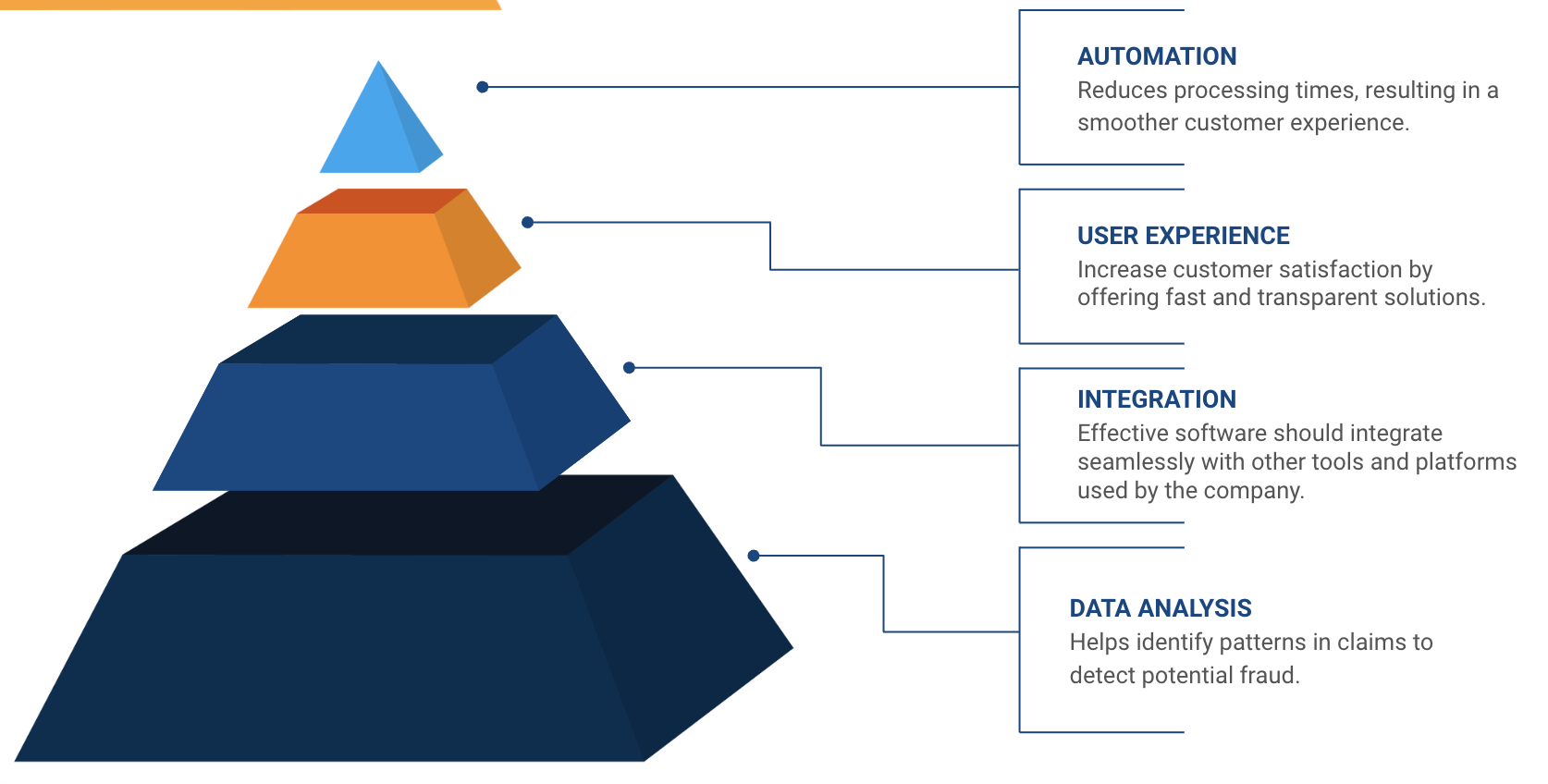
Features of an insurance claims management portal
November 19, 2024
Table of contents
Quick Access

The insurance industry is undergoing an accelerated digital transformation, driven by the need to improve customer experience and optimize operational efficiency. In this context, insurance claims management software has become essential tools for insurance companies. These systems allow complex processes to be automated and simplified, ensuring better customer service and more agile claims management.
According to Gartner, these solutions are applications designed to manage the entire claims workflow, from information entry to final payment, incorporating capabilities such as business process management (BPM), rules engines, collaboration and integration tools, and best practice templates.
In this blog, we present the main features that insurance claims management software should have, highlighting how these functionalities benefit both companies and policyholders.
Features of an Insurance Claims Management Software
1. Process Automation for Greater Efficiency
One of the fundamental pillars in such a software is process automation. According to a Deloitte report, automation can transform tedious claims processes by:
- Improving efficiency and dramatically reducing costs.
- Allowing customers to explore options and file claims anytime, anywhere.
- Minimizing fraud and increasing customer satisfaction.
- Resolving claims quickly, with the touch of a button.
Automation eliminates repetitive and error-prone manual tasks, such as data validation and document review, allowing teams to focus on strategic activities. In addition, it reduces processing times, resulting in a smoother customer experience and a competitive advantage for insurers.
2. Intuitive and accessible user experience
A claims management software should be designed with the user in mind, both for policyholders and company employees. This involves intuitive interfaces that allow customers to:
- Easily submit claims from mobile devices or web platforms.
- Track the status of their requests in real time.
- Receive notifications about relevant updates.
For internal staff, the system should include customized dashboards that provide a clear view of the workflow, automatic alerts, and tools to prioritize urgent cases. This user-centric approach not only improves productivity, but also increases customer satisfaction by offering fast and transparent solutions.

3. Integration with existing systems
Effective software should seamlessly integrate with other tools and platforms used by the company, such as CRM, ERP systems, or policy databases. Integration capabilities ensure:
- Quick access to relevant information, such as customer history and policy details.
- Seamless transfer of data between departments, avoiding duplication and errors.
- Improved collaboration between sales, customer service, and claims management teams.
Integration also allows insurers to leverage advanced technologies such as artificial intelligence (AI) and machine learning, leading to more informed and efficient decision-making.
4. Advanced data analytics for decision-making
Claims management generates a large amount of data that, if properly analyzed, can offer valuable insights to improve operations. Good management software should include advanced analytics tools that allow:
- Identifying patterns in claims to detect potential fraud.
- Evaluating the performance of claims adjusters and optimizing resources.
- Analyze resolution times to identify bottlenecks in processes.
- Predict future trends in claims based on historical data.
These features not only increase operational efficiency, but also help insurers be more proactive and strategic in their decisions.

5. Security and Compliance
Since claims management systems handle sensitive customer information, such as personal and financial data, security is a priority. Reliable software should feature:
- End-to-end encryption to protect data in transit and at rest.
- Multi-factor authentication to control system access.
- Detailed audits and logs to track activities within the platform.
In addition, it is critical that the software complies with local and international regulations related to data protection, such as GDPR in Europe or HIPAA in the United States, ensuring customer trust and company integrity.
6. Scalability to adapt to business growth
The insurance industry is dynamic and constantly evolving, so companies need technological solutions that can grow with them. Scalable claims management software allows you to:
- Adapt to an increase in claims volume without compromising performance.
- Incorporate new functionalities or integrate with emerging technologies such as blockchain or chatbots.
- Easily expand into new markets or lines of business.
Scalability ensures that companies do not have to replace their systems as they grow, saving significant time and costs in the long run.
7. Customization according to the needs of each insurer
Not all insurance companies have the same operational requirements or customer profiles. Therefore, management software must be highly customizable, allowing:
- Configuring specific workflows according to the types of claims.
- Adjusting business rules and risk assessment parameters.
- Creating customized reports and dashboards for each hierarchical level.
This flexibility is especially important for insurers that want to differentiate themselves in a competitive market and offer unique services to their customers.

The Role of Insurance Software Development Companies
Insurance software development requires a deep understanding of the needs of the industry as well as the regulations that govern it. Partnering with a company specializing in developing insurance solutions ensures that the system meets the highest standards of quality and functionality.
These companies can help design, implement, and maintain customized platforms that integrate industry best practices, ensuring a successful digital transition and optimal return on investment.
A well-designed insurance claims management software has the potential to completely transform the way insurers operate and serve their customers. From process automation and integration with existing systems to data analysis and security, each feature plays a key role in creating an efficient, scalable, and customer-oriented solution.
By investing in this type of technology, insurance companies not only improve their competitiveness, but also ensure the satisfaction and loyalty of their policyholders in an increasingly digital environment.
We recommend you this video
Related Blogs

Importance of an insurance quote portal

Banking software provider to prevent financial crimes

Why create a banking portal for customers?

Banking fraud detection and prevention with AI

What is Conversational AI for banks?

